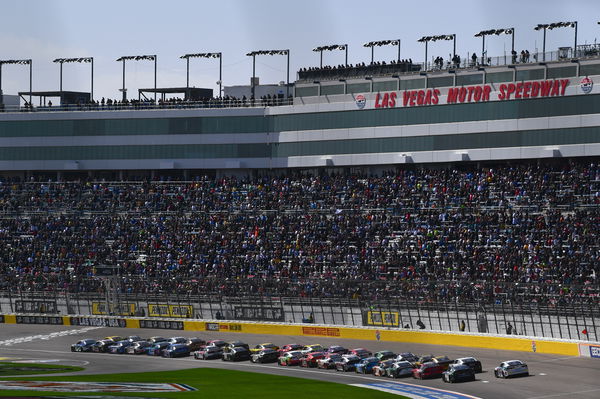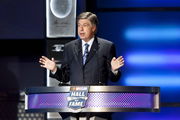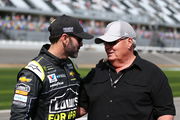
USA Today via Reuters
Mar 3, 2024; Las Vegas, Nevada, USA; NASCAR Cup Series driver Daniel Suarez (99) leads the field for the restart of the Pennzoil 400 at Las Vegas Motor Speedway. Mandatory Credit: Gary A. Vasquez-USA TODAY Sports

USA Today via Reuters
Mar 3, 2024; Las Vegas, Nevada, USA; NASCAR Cup Series driver Daniel Suarez (99) leads the field for the restart of the Pennzoil 400 at Las Vegas Motor Speedway. Mandatory Credit: Gary A. Vasquez-USA TODAY Sports
Back in the day, NASCAR used to be a dynamic sport. Drivers and racing teams brainstormed ways to innovate their cars and add that extra edge of speed. Gone are those days, ever since the sanctioning body came up with the Next Gen car in 2021. Now drivers are compelled to resort to pack-racing, leaving little room for individual talents to bloom.
Veteran racer Geoff Bodine bashes this racing parity. Bodine has mastered it all, won the Martinsville race in 1984, and kept the engines running for Hendrick Motorsports. But if he had been born just a few decades later, such an incredible feat probably would not have been possible at today’s Martinsville Speedway. In light of the recent Cook Out 400 race, experts lament this fact.
ADVERTISEMENT
Article continues below this ad
Lack of ‘finesse’ in NASCAR draws the ire of racing experts
The Martinsville track is a 0.526-mile paperclip-shaped short track, spelling infinite possibilities in light of the Bristol race. People were expecting another exhilarating tire-wear showdown like Bristol, only to have their hopes shattered. Denny Hamlin, who finished in 11th place, decried NASCAR’s parity obsession. In the Next Gen car, the Bristol winner could not pass Austin Dillon for 50 or 60 laps when the latter was not even in contention for a win.
The unfiltered experts of ‘Door, Bumper, Clear’ talked about the issue along similar lines. Bubba Wallace’s spotter, Freddie Kraft, said, “Bubba was moving around, trying to find speed. I’m like, ‘Dude, you’re the same speed as the leader.’ Like, that’s all we got. Everybody’s running the same speed, you’re not gonna gain, you’re not gonna lose, just don’t make a mistake. The frustrating part for me is when the race starts, everybody’s at the same speed. But when you get to lap 100 of a run, there should be some discrepancy”.
Then Kraft reminisced about the good old times in Martinsville, where talented drivers ran the show. T. J. Majors agreed: “Yeah, there’s no finesse to it. It’s literally, you drive as hard as you can, every single lap, and that’s it. You don’t have any technique to that track anymore…But you know how it used to be, you know, ‘watch this guy. He’s a little slower right now, but in 40 or 50 laps or even 70 laps, he’s gonna be fast the last 20 of a run.’ No, there’s none of that anymore.”
Yet in comparison to 2022, the parity level seems to have decreased. Two years ago, there were 19 different winners across nine teams. Now, we have five different winners hailing from just three teams. But the situation is still bleak for brilliant drivers like Denny Hamlin, who keeps clamoring for a raise in horsepower.
ADVERTISEMENT
Article continues below this ad
In line with the DBC guys’ nostalgic memories of the past, Geoff Bodine’s recollection might make you crave the good old days a little more.
Trending
That finesse existed in Bodine’s times
According to 18-time Cup winner Geoff Bodine, times started changing in the 1980s. Then corporate magnates turned NASCAR into a marketing tool, and racing parity slowly began trickling into the sport. But before that, a blooming of talents and innovation was allowed. “We always liked to be innovative. I always tried to design something better.” He further added: “We’d look at a pile of nuts and bolts, pick one out and put it where it needed to go.”
ADVERTISEMENT
Article continues below this ad
Such a scenario would now be illegal on the race track. “If you don’t put the right bolt in the right place, they have them numbered, you get fined. They tear your car apart and see that you got a nut and a bolt in the wrong place, you’re in trouble.” Bodine added: “They’ve taken a lot of fun out of it, but it’s big business. It’s more business than fun.”
With fans and racers demanding better quality races, hopefully, NASCAR will tone down on business priorities and tune up the fun factor.
ADVERTISEMENT
ADVERTISEMENT
ADVERTISEMENT
ADVERTISEMENT









